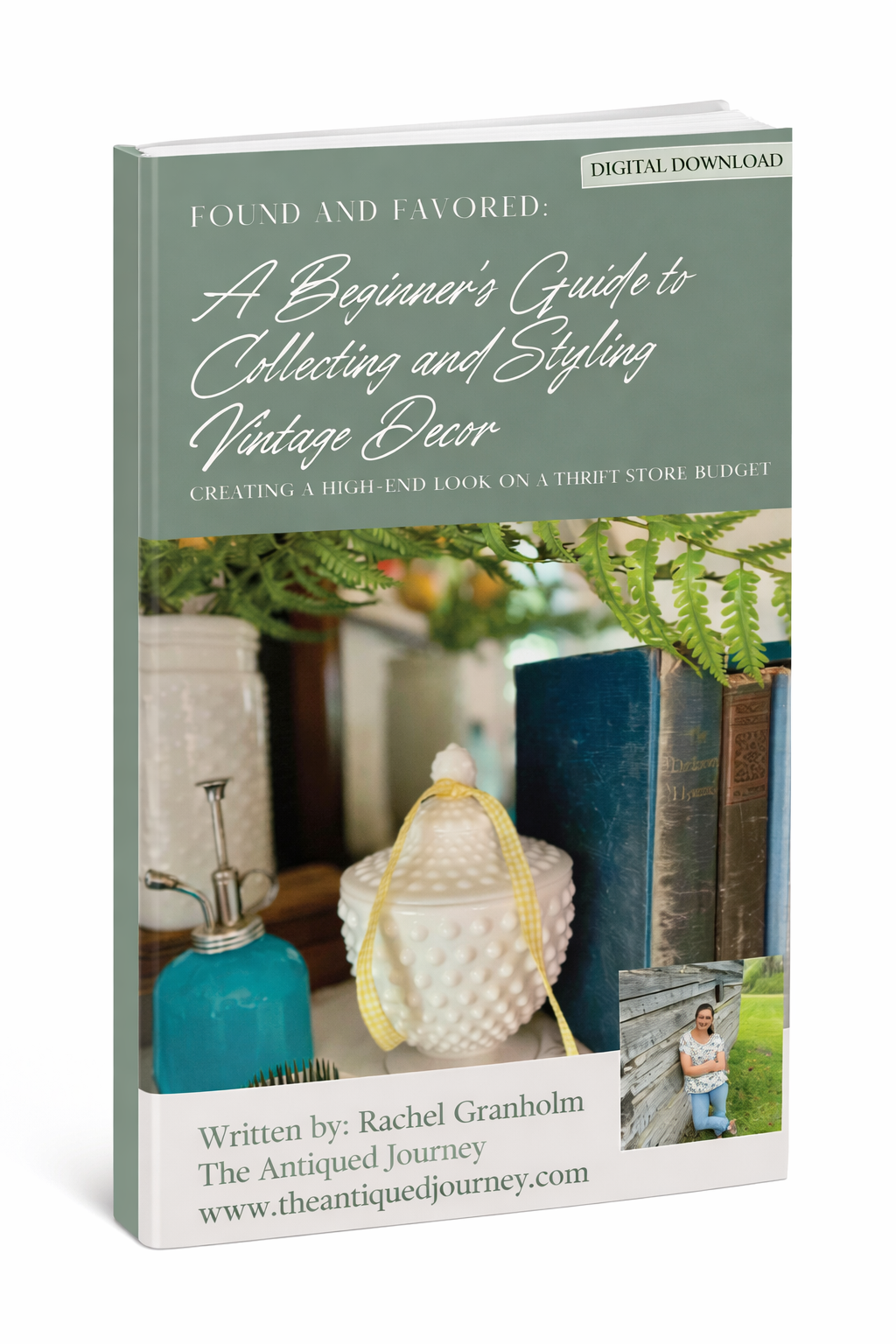Posts on theantiquedjourney.com may contain affiliate links. As an Amazon Associate, I earn on qualifying purchases. You can read the full privacy policy and disclosures here.
Repairing an Antique German Cuckoo Clock
By Rachel
|
Share this post. Share the Journey!
Last Updated on October 31, 2025 by Rachel
Bring an old clock back to life! Find easy tips on repairing an antique German cuckoo clock.
With my rich German heritage, this clock made me feel inspired to learn more. So, I got to researching the backstory of these clocks. I didn’t realize how much of an impact these clocks have on the German culture. Read on to learn more about the history of these clocks, repairing an antique German cuckoo clock, and simple decorating tips.
Bringing History Home: A German Cuckoo Clock
It’s one of the coziest sounds when my husband’s grandfather’s cuckoo clock chimes in our kitchen on the hour. Recently given to us, this beautiful German clock has been sitting in my in-laws basement for over 50 years, silent and collecting dust.
On a recent visit to my in-laws home, we brought this clock home with us and have been meticulously cleaning it. This includes taking it all apart and using Q-tips and clock oil to get in every nook and cranny of the clock’s insides to help it come back to life.
Shop German Cuckoo Clocks
More Than a Timepiece: The Rewarding Art of Restoring a Family Heirloom
The little bird that pops out of the door was black, and now after cleaning it, is actually white with pretty blue feathers painted on it and has a bright red beak!
Being at least 100 years old, this cuckoo clock hung in a Swedish farmhouse before immigrating with my husband’s grandfather’s relatives to the United States from Sweden sometime during the 1920’s! This cuckoo clock has had quite the journey and we are so happy to have it in our home.
These beloved clocks were created by Franz Anton Ketterer in 1730. Franz lived in a village in the Black Forest of Germany. Since then, the Black Forest has been one and the same with cuckoo clocks.
How Does a Cuckoo Clock Work?
Cuckoo clocks’ movements are driven by weights.
These weights, which hang underneath the clock, are often made to look as a part of the design being shaped like pinecones. Some clocks need to be wound everyday and others can go seven or eight days between windings.
So, with help from the weights, every hour on the hour a cute little door on top opens up and a figurine pops out as the bellows inside make the “cuckoo” sound. One “cuckoo” is chimed for each hour that passes; one “cuckoo” at one o’clock, two “cuckoos” at two o’clock, etc…
There are two types of cuckoo clocks; musical and non-musical. The musical ones play a melody after the “cuckoos” and have a third weight attached. Sometimes, depending on the clock, there will be dancers or other figurines that spin to the melody.
What Are German Cuckoo Clocks Made Of?
Black Forest clockmakers are extremely talented and gifted in their craft.
Some of them, like Hubert Herr, Gordian Hettich and Helmut Kammerer, were so devoted to the craftsmanship of these clocks. These clockmakers made each cuckoo clock by hand. Each one is made, to the highest quality, out of Lime Tree wood.
Some clocks were painted but most were not in order for the wood’s natural beauty to be seen. To this day, each piece of wood in an authentic, Black Forest cuckoo clock is hand-cut and engraved, including the roof shingles, figurines, and the decorative leaves.
Will a Cuckoo Clock ‘Go’ With My Existing Decor?
Cuckoo clocks are ornate and very decorative. Sometimes people will wonder if it will ‘go’ or match with their other decor.
Any cuckoo clock, no matter the size, needs it’s own space. If you have a large wall or a space that’s open that you don’t know what to do with, those are good places for a cuckoo clock to live.
In displaying the clock in that manner, you will be able to enjoy the intricacy of the clock on its own wall without anything else interfering with it.

Closing Tidbits on Repairing an Antique German Cuckoo Clock
Cuckoo clocks are a symbol of German heritage but you don’t have to be German to enjoy them! It’s deep wood color and the playful sounds are welcoming and adds warmth to your home. The quiet ticking of the pendulum makes for a very relaxing atmosphere.
I hope this inspires you to find a cuckoo clock for your home. It’s fun to learn a little more about your heritage and any special items that are attached to it. Prost!

Follow Along with The Antiqued Journey
Pinterest | Facebook | Instagram | LTK | Amazon
Let me know in the comments below if you would ever display a cuckoo clock in your home!
If you are new here, I’m Rachel, the writer and content creator here at The Antiqued Journey. I’m so happy to have you! I encourage you to stop by the ‘about me’ page to get to know me a little more.
Here on the blog, you will find loads of inspiration for decorating with vintage and antique decor, simple DIY crafts and many thrifting adventures. If that interests you, I invite you to sign up for my e-mail. You will receive a free digital download as a thank you!
Other Posts to Enjoy

Vintage Cafe Creamer Decor Ideas
Want to decorate with vintage finds more confidently?
I created a beginner-friendly, 34-page digital guide to help you collect, identify, and style vintage decor with intention—without overspending.

Hey! I’m Rachel!
I’m so glad you are here! Old things are my jam. Antique malls and thrift stores are my happy places.
Here on the blog I love to share my excitement, knowledge, and ideas about all things antique, vintage, and thrifted. Let’s journey together!
Want to style vintage decor with confidence?
Get the beginner’s guide that will save you money and help you find real treasures.
Sign me up for the
Journey!
Sign up for free antique and vintage inspiration, DIY projects, and thrifting tips straight to your inbox.






8 Comments. Leave new
Do you have a Cuckoo Clock or family heirloom on display in your home?
Yes I do
Rachel, I’m trying to find some one who could fix or just clean, what ever. German Black Forest Cucckoo Clock. Thanks
Hi!
Where are you located?
Hi Rachel, I too have a Black Forest cuckoo clock. We were stationed in Germany in late ‘50’s where mom got it. I tackled the task of taking off back and looking inside. It seems many loose parts. I have the chains and weights, but all seems locked up inside. Please direct me to anyone who might look at it. I live in S, Georgia. Thank you!
Hi, Jane!
First of all, thanks so much for the wonderful comment! I so enjoy hearing about other people’s stories.
Second, my husband is the one who actually fixed ours…it took many months of oiling the gears and things to get it running again. My best advice is to look up clock repair shops in your area. you can call the store and explain what you are seeing and they might give you an estimate over the phone, but many times they will want you to bring the clock in so they can be sure what needs to be done.
Hope that helps!
I just inherited the cuckoo clock my dad bought for my mom when we were stationed in Germany from 1980-1985. It’s a musical clock. I remember the day he brought it home. I was 8. My mom was so excited. I recall purposely changing the time to make it cuckoo. I even memorized the song. It was such a significant part of my childhood. I’m glad I’m the one that received it.
Hi, Lorie!
That’s amazing!! I love that…thanks so much for sharing! Hope you have a lovely week!